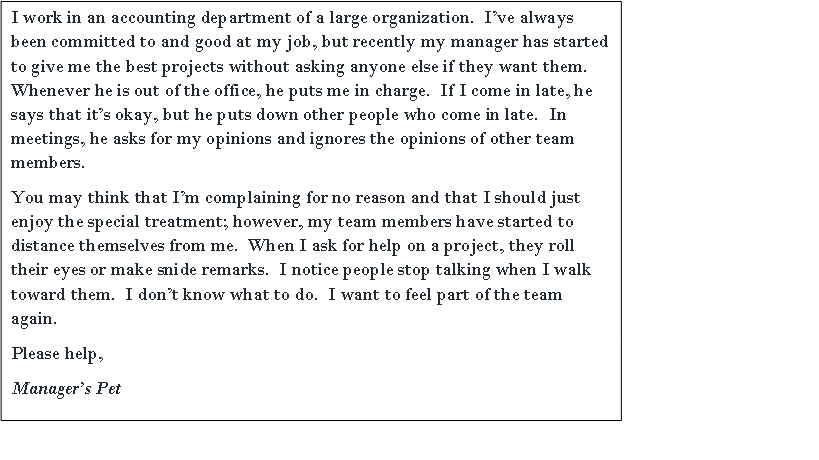I’ve commonly hear from people who have experienced the negative effects of workplace favoritism by not being favored by the manager, but recently I received a question from someone who is experiencing the negative effects of being favored by the manager.
 I appreciate you bringing up this question, because I’m sure many readers as well as your own team members don’t realize how the person receiving preferential treatment may feel.
I appreciate you bringing up this question, because I’m sure many readers as well as your own team members don’t realize how the person receiving preferential treatment may feel.
You’re in a difficult position because you don’t want to make your manager angry at you, but you also want to feel part of a team with your co-workers.
Your co-workers probably are not angry at you, but are angry at the treatment you are getting. They also may assume that you’re doing something to get the special treatment from the manager, such as spying on them and reporting everything back to your manager.
Start by confronting the behavior of your co-workers. When they roll their eyes when you ask for help, ask questions to get clarification without acting hostile. For example, you can ask “What’s wrong? Are you too busy or am I getting you at a bad time? Is there anything I can do to help you out to make it easier for you to help me with XYZ?” If this approach doesn’t work, set aside time to have individual conversations with your co-workers to discuss the problem. Chances are that each person has their own individual view of the situation and their own perception of you, so it’s better to talk to each person individually to understand their take on the situation.
Now, you still haven’t tackled the problem of how the manager treats you. If you tell your manager to start treating you worse so that other employees don’t get the wrong idea, it may cause your manager to get defensive and deny treating you differently. A better approach is to subtly help your manager treat everyone better. When your manager asks you to be in charge, suggest that different employees be put in charge in order to help strengthen their skills. Recommend someone else for the responsibility. Give credit for team members’ ideas and accomplishments during meetings so your manager will see that you’re not a one-man or one-woman show. Encourage other employees to have one-on-ones with your manager in order to get to know him or her better and also to talk about their career goals.
Don’t stop being a top performer. It may be the easy way out to start slacking off so you don’t get the preferential treatment, but it could ruin your good reputation and possibly your career at the company. You also don’t want to get so bogged down with your co-workers’ and manager’s treatment of you that you forget to focus on your own career goals. Know what your goals are and continue to work toward them.
